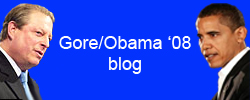Underestimating Obama
WASHINGTON—Barack Obama’s critics bear a remarkable resemblance to the liberals who labored mightily to dismiss Ronald Reagan in 1980.
Reagan’s foes wrote him off as a right-wing former actor who amiably spouted conservative bromides and must have been engaged in some sort of Hollywood flimflam.
Like Reagan’s enemies, Obama’s opponents concede that this Democrat gives a great speech. Indeed, both Obama and Reagan came to wide attention because of a single oration that offered hope in the midst of a losing campaign—Obama’s 2004 keynote to the Democratic National Convention and Reagan’s 1964 “A Time for Choosing” address delivered on behalf of Barry Goldwater. But surely speeches aren’t enough, are they?
Yes, Obama gets his crowds swooning. So did Reagan. It’s laughable to hear conservatives talk darkly about a “cult of personality” around Obama. The Reaganites, after all, have lobbied to name every airport, school, library, road, bridge, government building and lamppost after the Gipper. When it comes to personality cults, the right wing knows what it’s talking about.
But don’t worry, say Obama’s adversaries, he’ll collapse because voters won’t trust him to handle foreign policy. He’s too inexperienced and has these perilously idealistic ideas. Yes, and President Jimmy Carter’s campaign in 1980 was absolutely convinced it could persuade the country that Reagan was a dangerous warmonger who could not be trusted to keep America safe.
In any event, claim the anti-Obama legions, voters will eventually be persuaded that he is nothing but a big, bad liberal. He may make sweet bipartisan sounds, but the old attacks on left-wing ideology will work this time, as they always have.
The liberals who were so dismissive of Reagan similarly insisted that he represented the same “right-wing extremism” that voters had rejected in 1964 when they sent Goldwater to his landslide defeat.
Yet Reagan didn’t play to type. He reached out warmly to Democrats, notably in his 1980 convention speech that was his single most effective political sally.
“Everywhere we have met thousands of Democrats, independents, and Republicans from all economic conditions and walks of life bound together in that community of shared values of family, work, neighborhood, peace and freedom,” Reagan declared. “They are concerned, yes, but they are not frightened. They are disturbed, but not dismayed. They are the kind of men and women Tom Paine had in mind when he wrote—during the darkest days of the American Revolution—‘We have it in our power to begin the world over again.’”
You can almost hear the Republican crowd shouting, “Yes We Can!” Reagan offered, well, change we could believe in.
Still, Democrats kept telling themselves, right to November, that voters wouldn’t fall for any of this. Charisma, eloquence, idealism and hope were no match for experience, realism, prudence and predictability.
The Reagan metaphor explains why Hillary Clinton was in trouble from the moment she failed to knock Obama out of the race in Iowa. During the last two months, Democrats in large numbers have reached the same conclusion that so many Republicans did in 1980: Now is the time to go for broke, to challenge not only the ruling party but also the governing ideas of the previous political era and the political coalition that allowed them to dominate public life.
“This is our time,” Obama says in a short sentence full of meaning. The conservative age is as dead now as the liberal age was in 1980. Jimmy Carter, in many ways not a liberal at all, became the whipping boy for the end of liberalism. George W. Bush, no pure conservative, has come to symbolize the collapse of conservatism. “It is time to turn the page and write a new chapter in American history,” Obama says—exactly the sentiment of the Ronald Reagan who invoked Tom Paine.
The frustration of the Clinton campaign is understandable. Like George H.W. Bush, whom Reagan defeated for the presidential nomination in 1980, Hillary Clinton has worked very hard, knows government from the inside out, and would clearly provide the country with a safe set of hands. The Clintonites argue, fairly, that there is no way to know if Obama can live up to The Promise of Obama.
But the same was true of Ronald Reagan. In that 1980 speech, Reagan quoted a certain Democratic president who “told the generation of the Great Depression that it had a ‘rendezvous with destiny.’ I believe that this generation of Americans today has a rendezvous with destiny.”
Obama is being propelled by the same sense of historical opportunity, and that is why it will be hard to derail him.

























